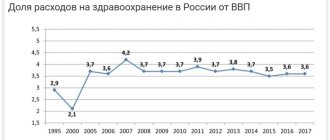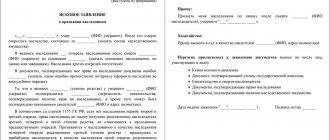Myths about the unworthy heir
| Misconception about when an heir is considered unworthy | Reality |
| Myth No. 1: An heir who leads an immoral lifestyle (does not work, drinks, communicates rudely with the testator and other heirs, etc.) | This is a characteristic of the moral image of a particular person and the law does not set worthy moral qualities of a person as an indispensable condition for receiving an inheritance. |
| Myth No. 2: Unfavorable relationship with the testator (conflicts, quarrels, hostile relationships, disrespectful statements, reviews about each other, mutual hatred, etc.) | Domestic troubles that do not turn into a criminal offense do not entail the loss of the opportunity to enter into an inheritance on a general basis. It is believed that these are only features of the relationship between the heir and the testator. |
| Myth No. 3: The successor did not maintain contact with the deceased, did not communicate, did not see each other, and showed up only at the time of receiving the inheritance | Lack of communication does not erase family ties and, accordingly, does not deprive a relative of the right to inheritance. |
| Myth No. 5: The testator did not receive the necessary financial assistance (for example, the heir did not help pay the bills for the apartment, refused to help with cleaning, minor repairs, and in the end lays claim to this apartment) | Providing assistance is voluntary and lies on the conscience of everyone, except in cases where such assistance was an obligation (alimony). An inheritance is not an investment and does not require material expenses to be incurred during the owner’s lifetime. |
| Myth No. 6: No care was shown to the deceased, there was no care, although this was necessary due to his old age and state of health. The heir showed no interest in the life of the deceased, including not attending the funeral. | This is a moral aspect that is subject to condemnation by society, but the law does not see this as grounds for disinheritance. |
| Myth No. 7: Declared unworthy in advance during the testator’s lifetime. | Interested heirs can deprive an unworthy inheritance, including invalidating a will, only after sad events. Otherwise it would seem insensitive and cynical. The law took this into account and provides for the possibility of exclusion from inheritance only after the opening of the inheritance. |
Unworthy heirs under a will
It is also possible to become an unworthy recipient of property left behind after the death of a loved one through a will. According to Article 1119 of the Civil Code of the Russian Federation, the testator has the right to independently determine the circle of his successors, the size of their share in the inheritance, and also establish a list of persons who will not be able to accept the inheritance.
An unworthy heir under a will is a person to whom the testator, for certain reasons, does not want to allocate the inheritance. These, as a rule, are close relatives of the deceased who could accept entry by law.
A citizen disinherited by a will does not have the right to join or transfer his share to another applicant.
Legitimate successors who were limited in inheritance rights by will do not have the opportunity to join. But it is worth remembering that it is impossible to limit by will the rights of the first priority applicants to receive a compulsory share.
What to do if the testator disinherits? The only course of action is to cancel the testamentary document. This can be done through the court, proving the reason for recognizing the paper as void. You can revoke a will if:
- The document is written on behalf of another person, but from the words of the testator.
- The paper has not been authenticated or does not contain the exact thoughts of the testator.
- The document was written under pressure or deception from third parties.
A will will also be canceled if it was drawn up by a citizen who, at the time of writing the document, was declared incompetent or could not account for his actions and their consequences.
Unworthy heir - who is it?
Many people put an everyday meaning into the expression “unworthy heir”: an indifferent attitude towards the problems of the deceased (lack of care, care, material and spiritual support), indifference to his fate, etc. This negatively characterizes a person morally, but other than public censure, it has no legal consequences.
The law lists specific cases of declaring an heir unworthy, when this may affect inheritance and property claims.
Illegal actions against the testator, co-heirs, inherited property
Such actions are considered to be:
- Severe, moderate and mild bodily harm, beatings, threat of harm, imprisonment, incitement to suicide, etc.
The purpose of these atrocities is to obtain the movable/real estate of the deceased for himself or other people (whose interests the person who is not worthy cares about), eliminating other claimants, increasing one’s share, etc. Example: a cousin (who does not inherit by law, since there are first-priorities) takes care of an elderly grandmother, but not out of good intentions, but out of self-interest. Coming to her, he threatens that he will cause death (poison, beat, etc.) if she does not sign over her apartment to him in her will. There is a death threat. Such a will is invalid and the recipient of the inheritance is inappropriate. - The use of cunning, misrepresentation, reporting false information, etc. The purpose of such behavior is still the same - to turn the well-being of the testator to one’s advantage.
Usually they deceive lucrative wills, persuade relatives to refuse to participate in the division of inherited assets, etc. Example : one of the sons told the testator that his other children tolerate him because of the apartment, secretly hate him, wish him death, etc. And he (who told this information) loves his parent, visits him, wishes him long life. At the same time, such a son inspired his father with the idea that it was unfair for such ungrateful children to get at least something from his savings. While other children live far away and, for family reasons, rarely visit their parent, but worry about him and pass on gifts and money through their negligent brother to support their father. As a result, the will was made for a liar who took everything into his own hands. - Deprivation of life of the testator. Such a serious crime does not require motives aimed at inheritance redistribution. The occurrence of death means the opening of an inheritance, which in itself leads to the possibility of an attack on the estate of the deceased. Therefore, a murderer who was motivated by revenge, jealousy, hostility, hooligan motives, etc. can be excluded from inheritance. Only negligent homicides are excluded.
- Theft of things and/or money, as a result of which the share of other relatives and other persons specified in the will is reduced.
- Theft, forgery of wills, applications for renunciation of inheritance, documents on kinship, registration at the place of residence, etc.
Example : a cousin’s granddaughter falsified information in the apartment register, as well as a certificate of her disability, thereby creating the appearance of living at the address with the deceased and being dependent on him. Thus, she fictitiously became the heir of the first line and took possession of all the property, leaving the second-line successors with nothing.
The above actions must be confirmed by judicial acts: either a verdict (in criminal cases) or a decision (in civil cases).
Loss of parental rights
Fathers and mothers deprived of parental status by the court cannot assert their claims to the belongings of a deceased child. Also, but without court decisions, biological fathers who have not officially adopted children do not have inheritance rights.
Failure to fulfill legal obligations to provide material support to the testator
- Significant alimony debt that must be awarded (voluntary alimony does not count). The resulting debt can be confirmed by an act of justice (sentence, decision) and a certificate from the bailiff and a receipt from the alimony officer about the overdue share and other similar documents.
- Evasion of parents from maintaining children (including foster children, adoptive parents). Parents are required by law to provide for their children. There is no need to confirm such a social vocation in court (as is necessary with alimony). A disregardful attitude can be verified by any means (conclusions, orders from the guardianship authority, statements from schools, kindergartens against parents, testimony of witnesses, etc.).
Those indifferent heirs who are called up by law can be excluded from inheritance due to failure to fulfill alimony obligations. On this basis, persons appointed by the will cannot be excluded from participation in the inheritance matter.
Confirmation of the status of an undeserving successor is made by the court at the request of an interested person.
Removal by the testator
The latter can, during his lifetime, without any justice, by his willful decision, remove any potential applicant from his capital. Even a passing indication of this in the will will be enough. The only person who is not affected by such a will is those inheriting the obligatory share.
Unworthy heirs can be persons who are immediate heirs, as well as his descendants (for example, if the son of the deceased should inherit, but he is no longer alive, then his daughter/son, i.e. granddaughter/grandson, acts instead of him by right of representation deceased).
The procedure for excluding unworthy heirs from the list of heirs
In order to exclude from the number of heirs citizens who are illegally trying to enter into an inheritance, and parents who are deprived of parental rights, it is necessary to submit an application to the notary in whose proceedings the inheritance case is located.
The application must be accompanied by a court decision or verdict (on deprivation of parental rights, on invalidation of a will), on the basis of which the notary will exclude specific persons from the list of heirs.
However, to recognize a citizen as unworthy, a court decision is not required (paragraph “b”, paragraph 19 of Resolution of the Plenum of the Supreme Court of the Russian Federation No. 9 “On judicial practice in inheritance cases”).
The difficulty is in excluding from the list of heirs citizens who maliciously evade the responsibilities of maintaining the testator:
Action 1. Preparation of the statement of claim and necessary documents
An application for the removal of an unworthy heir from inheritance on this basis can be submitted by a person who has a certain interest in the vocation of inheritance or in increasing the share of the inheritance due to him, as well as by a legatee or a person whose rights and legal interests may be affected by the transfer of inherited property (for example , for the right to use inherited residential premises).
This is provided for in paragraph 20 of the Resolution of the Plenum of the Supreme Court of the Russian Federation No. 9 “On judicial practice in inheritance cases.”
The statement of claim must be accompanied by the documents provided for by law (Article 132 of the Code of Civil Procedure of the Russian Federation; paragraph 3 of paragraph 1 of Article 333.19 of the Tax Code of the Russian Federation; paragraph 20 of the Resolution of the Plenum of the Supreme Court of the Russian Federation No. 9):
- copies of the statement of claim in accordance with the number of defendants and third parties;
- document confirming payment of state duty;
- documents that confirm the circumstances referred to by the plaintiff; copies of these documents according to the number of defendants and third parties: copies of the death certificate;
- birth certificate, death certificate, etc.;
- copies of those documents that confirm the malicious evasion of the unworthy heir to support the testator: a court decision on the collection of alimony and liability for late payment of alimony;
- certificate from bailiffs about the presence of arrears in the payment of alimony, etc.
Action 2. Submitting a statement of claim and necessary documents to the court
An application for declaring a person unworthy due to his malicious evasion of the obligation to support the testator is submitted to the district court at the place of residence of the defendant (Articles 24, 28 of the Code of Civil Procedure of the Russian Federation).
Malicious evasion of duty is the failure to provide maintenance without good reason, concealment of information about the actual amount of earnings or income, change of place of work, change of place of residence, and other actions.
However, the court in each specific case determines the malicious nature of evasion of duty depending on the reasons and duration of such evasion.
Only if the fact of malicious evasion from fulfilling his legal duties is proven, the court can remove the heir from inheritance (clause 20 of the Resolution of the Plenum of the Supreme Court of the Russian Federation No. 9).
Action 3. Obtaining a court decision and presenting it to a notary
The trial ends with a decision by the court.
This decision comes into force after a month from the day when the decision was made in final form and was not appealed (Part 1 of Article 209, Part 2 of Article 321 of the Code of Civil Procedure of the Russian Federation).
The interested person submits a court decision that has entered into legal force to recognize the heir as unworthy and remove him from inheritance to the notary at the place where the inheritance case was opened.
Based on the submitted court decision, the notary excludes the unworthy heir from the list of heirs.
Grounds for which the heir cannot be recognized as unworthy
In fact, judges more often refuse to establish unworthiness than grant claims. The reason for this is the plaintiffs’ misconceptions regarding the grounds on which the defendant is found improper.
From the mass of cases, typical examples can be identified when claims for an unworthy heir will not be satisfied:
- prohibition (preventing) co-heirs from using the testator’s property (for example, not letting them into the apartment, not giving the keys to the front door, etc.);
- personal use of the deceased’s belongings without re-registration in his name (for example, a car is used in the period before the issuance of an inheritance certificate by a notary);
- violation of an agreement between relatives on the conditions and extent of division of inherited property;
- failure to fulfill a promise given to the testator regarding the fate of his property;
- isolation of the testator from other relatives and preventing communication with them;
- concealing the fact of death from relatives;
- failure to inform the notary about the presence of co-heirs, wills in favor of other persons, about the property of the deceased, etc.;
- avoidance of participation in burial, installation of a monument and failure to comply with other funeral ceremonies;
- hostile relationship with the deceased, interpersonal conflicts, quarrels, disrespectful attitude, slander, insult, etc.;
- leading an asocial lifestyle, committing immoral acts, immoral attitude towards loved ones, etc. (for example, prostitutes, drug addicts, criminals in prison or previously convicted (with the exception of crimes against the deceased and co-heirs));
- establishment of guardianship, during which the capital of the ward-testator was realized;
- attempts to challenge a will drawn up in favor of another heir, the right of ownership of the inheritance. property, etc., even if the courts were lost by the disputant and he did not have obvious grounds for the proceedings;
- careless, irresponsible attitude towards the things of the deceased;
- leaving without the necessary treatment or medical care in case of a serious illness of the testator (except if these actions led to death);
- lack of care, interest in the life and health of the deceased;
- inducing the testator to drink alcohol and lead a parasitic, unhealthy lifestyle;
- marriage shortly before death without the intention of starting a family, in the absence of cohabitation, a common household, or mutual care.
When can an heir be disinherited?
There is no strictly defined period for disinheriting an unworthy heir. This can be done both before the death of the testator and after the opening of the inheritance case.
During his lifetime, the testator can personally remove any relative from the estate he leaves behind by expressing his wishes in a will.
In all other cases, it is possible to limit the heir only after the death of the testator. It does not matter whether the undeserving heir took any action to re-register the property of the deceased. The general period when you can go to court is no more than three years from the date of death.
However, there may be cases where this period may increase, although this is a very rare occurrence.
Example: a person is not a relative of the deceased, but is named in the will. For a long time, no one knew about him as a candidate or about the will. The relatives accepted the deceased's condition according to the law. And now, three years later, he declared his claims, inscribed in his will. Restored the deadline for entering into inheritance property rights and is trying to redistribute inheritance shares. Interested relatives may request the restoration of the deadline for filing a claim to declare the newly-minted successor unworthy. Such a period can be established from the moment when the plaintiffs became aware of the claims, that is, after the expiration of the general three-year period.
Restoring the rights of unworthy heirs
What to do if you are recognized as an unworthy heir? Is there really nothing we can do and will we have to accept the situation?
Restoration of lost rights occurs through the courts. For example, if a citizen has been deprived of parental rights, he can restore them when life conditions arise: this includes changing his previous lifestyle or attitude towards the issue of raising children. A parent who has lost parental rights can initiate a court hearing (Article 72 of the RF IC).
For example , the father was deprived of parental rights for drinking alcohol, lack of work, and failure to pay child support. Over time, he came to his senses, got a job as a mechanic at a factory, got rid of bad habits, found money and began to transfer part of the funds to his son. Given the dramatic changes in his life, the father may apply for restoration of parental rights. Consequently, he will be among the child's heirs.
If there is a court decision regarding a deceased parent, his descendants can apply to the court to review the decision. However, they will need to provide convincing evidence of his innocence: medical reports, SSP certificates about debt repayment, a job description, a 2-NDFL certificate of income, an extract from the Unified State Register of Property Rights, an application from the second spouse, etc.
The procedure for declaring an heir unworthy
Such a person can be excluded from the list of successors only through a judicial procedure, if the deceased himself did not indicate this in the will.
Judicial practice on the unworthiness of heirs provides for the following types of acts of justice, which are the basis for exclusion from inheritance:
- Verdicts of crimes committed against the testator and/or heirs, and affecting inheritance legal relations;
- Decisions to invalidate wills, donation agreements, purchase and sale agreements (due to forgery, compulsion to draw up (conclusion) by deception, threats, etc.) made in favor of the person not honored;
- Court decisions on deprivation of parental rights;
- Decisions directly declaring an unworthy heir. Most often, such judicial acts are issued to confirm the failure to fulfill alimony obligations. In parallel, such decisions also state other claims (for recognition of the absence of property rights, for the invalidity of the inheritance certificate, etc.).
As you can see, acts of justice can be in criminal and civil cases. And the WTO does not take decisions of administrative judges into account.
General recognition procedure
- Court documents. First, the applicant needs to obtain the appropriate sentence/decision. The judge's document may already be ready; it just needs to be requested from the court in the appropriate form (a certified copy will be issued). If the litigation process is in full swing, the notary in charge of the inheritance case should be informed about this (write an application to suspend the inheritance actions until the end of the proceedings).
- An appeal to the notary who opened the inheritance case to remove an improper person from participation. Naturally, there should already be an act of justice on hand. It is better to formalize the appeal itself as a free-form application with a verdict/decision attached to it. The notary employee is obliged to register the application in the application journal (log of incoming correspondence) and issue a receipt for receipt of documents.
- Direct exclusion. The notary does not issue any special documents about exclusion from inheritance or about the results of consideration of the application for unworthiness. The fact of excommunication of an unworthy applicant from the inheritance is reflected in the certificate of inheritance (in which the unworthy applicant will not appear). Usually, the notary’s office informs both the applicant and the person being excluded about the fact of exclusion before issuing a certificate.
- Appealing illegal actions. If a notary employee issues an incorrect certificate, that is, in which an undeserving heir will be listed, then the problem is solved by going to a judicial institution.
You can file either an application to appeal the actions of the notary or a claim to invalidate the certificate of inheritance, to recognize the ownership rights of an improper successor as absent, etc.
Recognizing a successor as unworthy without a notary
A similar mechanism is inevitable when:
- The court makes decisions that regulate all inheritance and property issues. It happens that a judge not only approves an unworthy successor, but also immediately divides the entire inherited capital between the co-heirs. Such a judge's ruling replaces a notarial certificate. The case conducted by the notary is subject to termination in this case. Interested successors (in whose favor the decision was made) only need to notify the notary office about this. Re-registration of rights to property (in the name of the heirs) is carried out by a judge's decision.
- Late judicial acts confirming the status of an undeserving successor, that is, issued by the time the inheritance case is already closed and the certificate is issued (after 6 months from the date of death of the testator). This happens due to the length of the trial, failure to submit to the notary an application to suspend the implementation of activities in the inheritance case for the duration of the litigation, etc. In such situations, an additional appeal to the judge is required with demands to invalidate the certificate of inheritance and division of inherited assets.
The procedure for distributing the assets of an unworthy heir
The property that was awarded to the unworthy applicant is divided equally among the other applicants. Consequently, the share of property of each heir increases in proportion to the added share. As we found out above, the basis is a court decision.
The document must be presented to a notary. Moreover, it is not necessary for a court decision to declare the applicant unworthy. A decision made on the basis of the first two paragraphs of Art. is sufficient. 1117 of the Civil Code of the Russian Federation: crime against the testator or non-payment of alimony and deprivation of parental rights.
Sample statement of claim
Form and content of the statement of claim
The presented sample is a classic one. A large number of claims are filed in this form. Depending on the individual case, the application may contain information and data necessary to resolve specific inheritance issues. But in any case, the statement of claim must meet the basic requirements:
Court and state duty
The application is submitted to the district/city court at the place of residence of the defendant, even if the inheritance case was opened in another place. The state duty is 300 rubles.
Plaintiff
It may be a person whose rights and interests have been harmed or threatened (possibly threatened) due to the inheritance rights of an undeserving claimant. Typically, such an interested party is a dependent of the testator (having the right to succession), a person indicated in the will, and, of course, a relative-heir in the closest line. Heirs of distant lines who are not owed anything (due to the presence of other successors of closer kinship with the deceased) cannot file claims for removal.
Example: the deceased has a brother (second-stage heir) and an uncle (third-stage heir). The biological parent entered into the inheritance, established paternity and accepted the property as a priority. His uncle will not be able to recognize him as unworthy, since he has no real opportunity to receive property, since the brother of the deceased is in front of him in line. But the brother can file a claim, because if the father is removed from inheritance, then everything will be left to the brother.
general information
At the beginning of the descriptive part of the claim, it is required to provide information about the testator (full name, date of death, details of the death certificate), about co-heirs (full name, document confirming the right of inheritance), about the property of the deceased (composition, documents , confirming ownership, location, etc.), about the acceptance of the state by successors (an application was submitted, actually accepted, a certificate was issued, etc.), about the notary who has the file (full name, location address), etc. .
The essence of the claim
The most important point in the claim is how to prove that the heir is unworthy. It is necessary to describe in detail, but without emotions or unnecessary everyday details, what exactly the behavior and actions of the defendant consist of, which are the basis for deprivation of his inheritance and property rights. When describing, one should indicate the time, place of events, the persons involved (the perpetrator and the victim), the specific actions of the defendant, his goal, attitude towards his actions, what the consequences of the crime look like, etc. It is very important to indicate what confirms the illegal actions. We should not limit ourselves only to acts of justice. It would not be superfluous to provide other evidence (for example, a certificate from a bailiff confirming the alimony debt).
What should you especially pay attention to when proving the grounds of unworthiness?
- if these are crimes against the testator, co-heirs, then it is necessary to confirm the very fact of committing the act (which is criminal), that the criminal’s motives are related to obtaining an inherited advantage (if the testator was murdered, the motive does not matter), the testator or heirs actually suffered from actions of the offender, etc. Everything is certified by a court verdict.
- when we are talking about a civil offense (invalid will, power of attorney, application to renounce the property of the deceased, etc.), it is required to establish that the person not honored committed an illegal act in the field of civil law, it was directed against the estate of the deceased, against his will and the desires of other co-heirs, the defendant has an illegal benefit, and the co-heirs, on the contrary, have not received (have not received) what is due. All this is confirmed by the decision of the civil court.
- in case of failure to fulfill the obligations to support the testator, it must be shown that there is a legal obligation for care and maintenance (this is a court decision on alimony, a birth certificate), which is violated, that is, there is an alimony debt, the fact of evasion of payments, concealment of financial sources and etc. This can be evidenced by judicial acts and testimony of witnesses, certificates and other written evidence.
Claim
Basically, the plaintiffs ask the court to declare the defendant unworthy and exclude him from inheritance. But sometimes this is not enough to solve a specific problem. Therefore, the statement of claim against an unworthy heir includes the following additional requirements:
- recognition of a will, power of attorney, certificate of inheritance, contract as invalid;
- restoration of the period for entering into inheritance;
- inclusion of a specific thing in the inheritance mass;
- recovery of unjust enrichment;
- establishing ownership of inherited property;
- recognition of the inheritance as accepted;
- eviction and recognition as having lost the right to use real estate;
- recognition of property rights as absent and cancellation of state registration.
When it comes to the question of what to ask the court and how to combine demands (in one claim or in different ones), it is better to trust a lawyer specializing in inheritance cases, so as not to overload the case or create insurmountable obstacles for yourself.
Grounds for recognition as an unworthy heir
You need to challenge the right of claim of another heir and recognize him as an unworthy heir . But for this there must be rules of inheritance provided for by law:
- Deliberately and illegally contributed to or committed an inheritance contrary to the will of the deceased ( committed a crime against the testator),
- Deliberately and illegally wanted to increase the part of the inheritance that they would have received, or did so,
- If parents are deprived of rights in relation to children,
- Draft dodgers, that is, those who did not fulfill their obligations under the law (most often alimony, both for children and parents).
These are the grounds on which you can recognize the heir as unworthy. What is the order?
Consequences of declaring an heir unworthy
It should be noted right away that an undeserving successor is excommunicated from the inheritance for all types of reasons (both by law and by will); he loses the right to an obligatory share; does not have the right to testamentary refusal; co-heirs are not allowed to renounce their inheritance share in favor of the removed one and vice versa (an unworthy successor cannot renounce their share in favor of other heirs); and even if there are no heirs left (except for the removed one), then the state of the deceased passes to the benefit of the municipality (for example, in addition to the unworthy one, there was another relative who went to court to establish unworthiness, and he himself died or abandoned it before the inheritance was closed).
Removal from inheritance leads to changes in the procedure for conducting the inheritance case and the distribution of the property of the deceased between the applicants.
In general, the consequences of disinheritance concern not only the most unworthy successor, but also his followers (children, grandchildren, parents).
Consequences for the most unworthy successor
Depending on when the successor is deprived of inheritance and property rights: before or after the acceptance of the property by all recipients of the inheritance, one can judge the scale of the measures necessary to put everything in its place.
If the heir is labeled “unworthy” before the inheritance is closed, the notary promptly takes this into account when dividing the deceased’s belongings and issues a certificate to the remaining relatives.
In situations where the deadline for accepting the inheritance has expired and the notary has closed the case, you have to fuss more.
Most often, the interested relative decides to cancel the inheritance certificate and redistribute shares in the property.
If you are less fortunate and the undeserving successor manages to sell off the received share, then the inheritance must be returned (reclaimed from someone else’s possession, the new owner’s property rights annulled, his right to property recognized, etc.) or monetary compensation must be demanded (payment of unjust enrichment, compensation for losses, etc.). All these problems are regulated by judicial procedures. There is no universal way to act better and more effectively. It is best to seek the help of professional lawyers who will analyze the situation, give a legal opinion and suggest ways to solve the problem.
In such situations, it gives optimism that if the undeserving person received a certificate of inheritance, sold or squandered the received wealth before the removal procedure was completed, this does not mean that the consequences are irrevocable. It will never be too late to get everything back. But still, you shouldn’t delay, since there are deadlines for claims (1 or 3 years depending on the category of court cases), and it’s easier to look for the truth based on fresh leads.
Consequences for others
The negative results of disinheritance directly affect the heirs of the disinherited successor (in the event of the death of the latter). The principle of chain reaction applies here. How it happens in practice:
The unworthy did not have time to accept the inheritance
As a general rule, when a potential heir dies before entering into inheritance rights, his powers as a successor are transferred to his children (representation or transmission). The suspended status is also transferred. This means that the status of unworthy passes to the next generation. It turns out that his children are responsible for the behavior of an inappropriate heir.
Example: the deceased had a son who died 3 months after the death of his father, without inheriting the fortune. In addition, this son was recognized as an improper heir. As a result, the children of the testator's son were also unable to take over their grandfather's inheritance rights, since the inheritance by proposal was lost along with their father's inheritance rights.
Before removal, the inheritance was transferred to the next generation
There may be situations in which an undeserving heir, before being recognized as such, manages to accept the state of the deceased, and then he himself dies, leaving an inheritance to his successors, the so-called re-inheritance. It turns out that the property of the first testator passes to the heirs of the next generation (children of the removed successor). And they may lose things that belonged to the original testator.
More often this happens when legal disputes about the unworthiness of inheritance drag on, and procedures are underway to restore the period for entry into inheritance by other co-heirs.
As a result, if the successor is deprived of inherited capital, then other relatives claim it, and they can reclaim the property of the deceased from subsequent heirs. Since it is believed that such re-inheritance is illegal and specific things from the property of the original testator are subject to return to his worthy successors.
A similar situation awaits those persons to whom an undeserving heir gave it, sold it, etc. things of the testator or even refused the property of the deceased in their favor.
Example : a son and two sisters appeared in the inheritance case. One of the sons turned out to be an undeserving successor, but he refused his share (1/3) in the interests of his sister. By the time the son-refusenik was deprived of his inheritance powers, the shares were distributed among the remaining successors: brother 1/3, sister 2/3. Although the unworthy person did not receive anything, he managed to dispose of the property from which he was excommunicated. Therefore, these shares will be replayed: both brother and sister will receive ½ share in the capital.
Consequences of declaring an applicant unworthy
If, following a court hearing, the court satisfies the claims, the heir will become unworthy and lose the right to the property of the deceased. The returned property is distributed among the remaining heirs.
What to do if a person has already entered into rights? The property he received must be returned . If the heir cannot return it in full, he will have to compensate the other heirs for the value of the assets.
The price of the inheritance is determined on the date of its acceptance - the cadastral, market or inventory value is taken as the basis. Notaries and courts request an up-to-date assessment, i.e. archived data will not work. Read more about this in the article “Valuation of property upon entry into inheritance.”
Can the descendants of an heir who has lost the right of inheritance inherit assets by way of representation? No, because the legislator deprived them of such an opportunity (clause 2 of Article 1146 of the Civil Code of the Russian Federation).
Example. The plaintiff filed an application to declare the heir unworthy. At the same time, a claim was made for the recovery of unjust enrichment. The essence of the dispute is that after the death of the grandparents, an inheritance was opened, which was accepted by the plaintiff’s father. Soon the man moved into the house with his family, including the plaintiff. Later, the marriage broke up: the plaintiff left home with his mother, and some time later his father died. On the day of his death, the plaintiff was a minor - therefore, he could not inherit on his own. The testator's half-sister took advantage of this. She filed a claim to extend the deadline for taking over her grandparents' property. The woman indicated in the statement that there are no other heirs besides her. She also hid the fact that her brother actually accepted his parents' inheritance. The plaintiff considers the actions of the heir illegal and such that they led to the illegal enrichment of the defendant. The court partially satisfied the claims and recovered from the defendant an amount commensurate with the share of the inheritance that was due to the plaintiff (Decision of the Dorogobuzh District Court of the Smolensk Region dated October 18, 2017, case No. 2-294/2017).
How to divide the inheritance after identifying an unworthy heir
Division in the presence of a will in which an unworthy person appears
- A will for all property in favor of one all-heir (disqualified). In fact, the will becomes unexecutable. All applicants inherit on the basis of the law in order of priority, which is established according to the degree of relationship to the testator.
- Only part of the property is bequeathed; the will specifies one heir (unworthy). This part of the inheritance property is also released from the terms of the will and goes to the general inheritance mass for division according to the law.
- All property is bequeathed; Several co-heirs were named, including the undeserving one. The estate asset is divided only among the persons named in the will, minus the absent beneficiary.
- A separate thing from the inheritance mass is bequeathed; the will names several successors along with the disinherited one. This specific thing (car, real estate, deposit, etc.) is redistributed among those indicated in the will. The rest of the property is in the general order, without the participation of those deprived of inheritance powers.
Distribution of inheritance in the absence of a will
The removed person is an all-heir (the only representative in his line of heirs). This queue is considered empty (without applicants). The inheritance is accepted by the successors of the next line (in descending order). Let's say the unworthy one was the first-priority successor. After its exclusion, the second line is called upon to inherit.
The unworthy person is one of several priority co-heirs (the line that is called to inherit). The order of inheritance does not change (that is, subsequent relatives (lower in line) are not called upon to participate in the division of property), however, the inheritance shares of the participants in the current line increase due to the departure of an undeserving relative.
Article 1117 of the Civil Code of the Russian Federation
Disputes surrounding inheritance are quite common, and in some cases justified. Citizens who do not have a moral or legal right to do so can apply for property. For the sake of making money, some are capable of forging documents, forcing them to write a statement, and resorting to various tricks. Such cases are not isolated; they are considered separately in an article in the Civil Code, in the section on inheritance issues.
Article 1117 of the Civil Code of the Russian Federation describes the concept of unworthy heirs. According to the text of the article, the right to inheritance is deprived of citizens who have committed acts contrary to the distribution of the inherited mass, causing harm to the testator and applicants. Persons who attempted to seize property that was not due to them by inheritance.
The law provides for deprivation of inheritance rights to parents deprived of parental rights who do not pay child support. Children - persons obligated by law to support and care for the testator - who do not fulfill their duties are deprived of their rights.
If the heir assumed his rights before the court's decision, the inheritance is returned and the income received from it is compensated.
They may be recognized as unworthy heirs, with all the ensuing consequences, regardless of the principle of distribution of property.
We recommend reading: Heirs of the first stage after the death of a grandmother








